Healthcare Access and Catholic Social Thought in Australia Essay
VerifiedAdded on 2022/09/28
|5
|965
|31
Essay
AI Summary
This essay examines healthcare access in Australia, highlighting significant disparities between rural and urban populations. It discusses how the principles of Catholic social thought, which emphasize the dignity of human life and the common good, are challenged by these inequalities. The essay explores the barriers to healthcare access faced by rural residents, including financial constraints, geographical limitations, and shortages of healthcare providers. It emphasizes the need for equitable healthcare provision and proposes that the government should invest in healthcare infrastructure, and encourage healthcare professionals to work in rural areas to ensure that all Australians have equal opportunities to access essential health services. The analysis concludes that addressing these disparities is essential for upholding human dignity and realizing the common good in Australia.
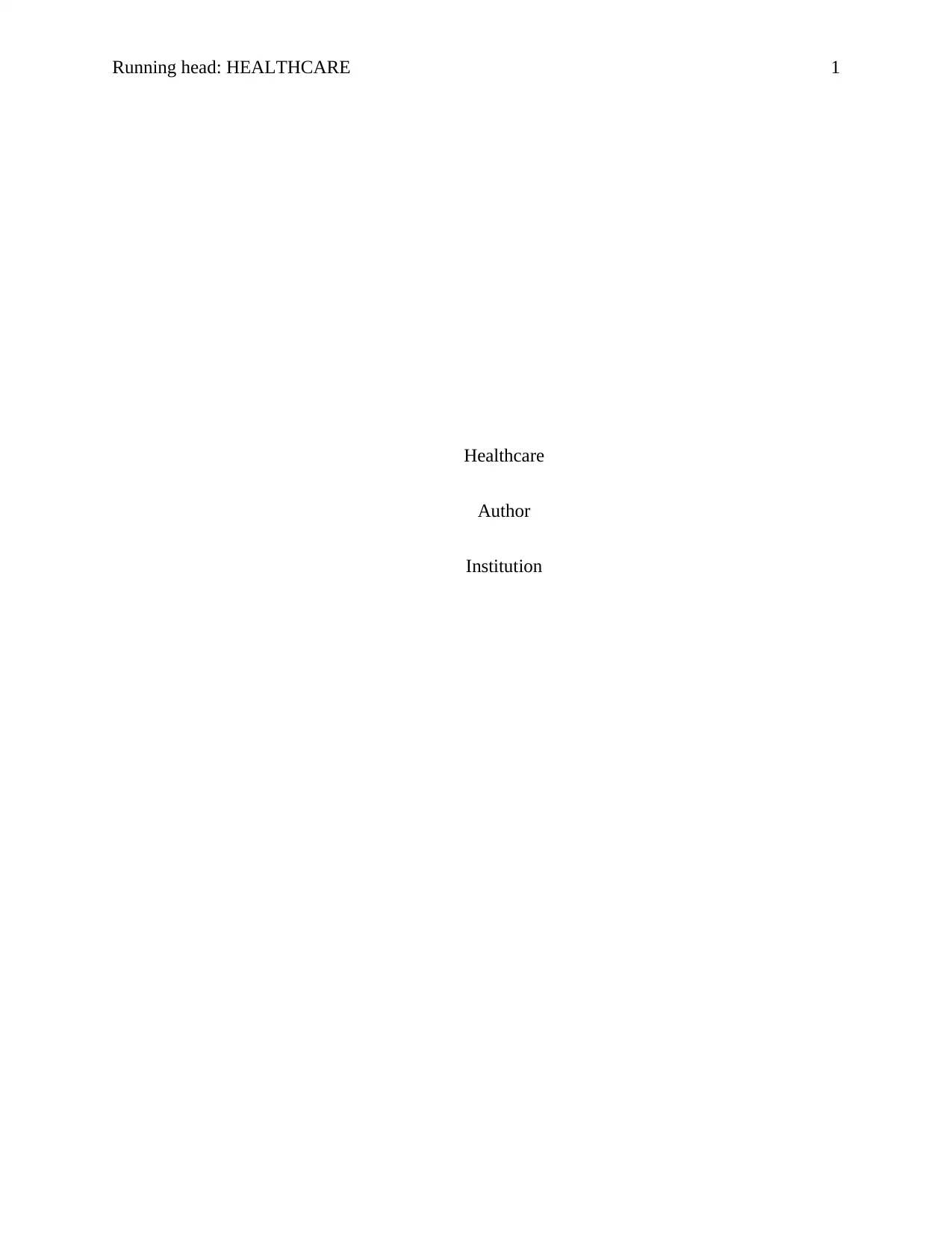
Running head: HEALTHCARE 1
Healthcare
Author
Institution
Healthcare
Author
Institution
Paraphrase This Document
Need a fresh take? Get an instant paraphrase of this document with our AI Paraphraser
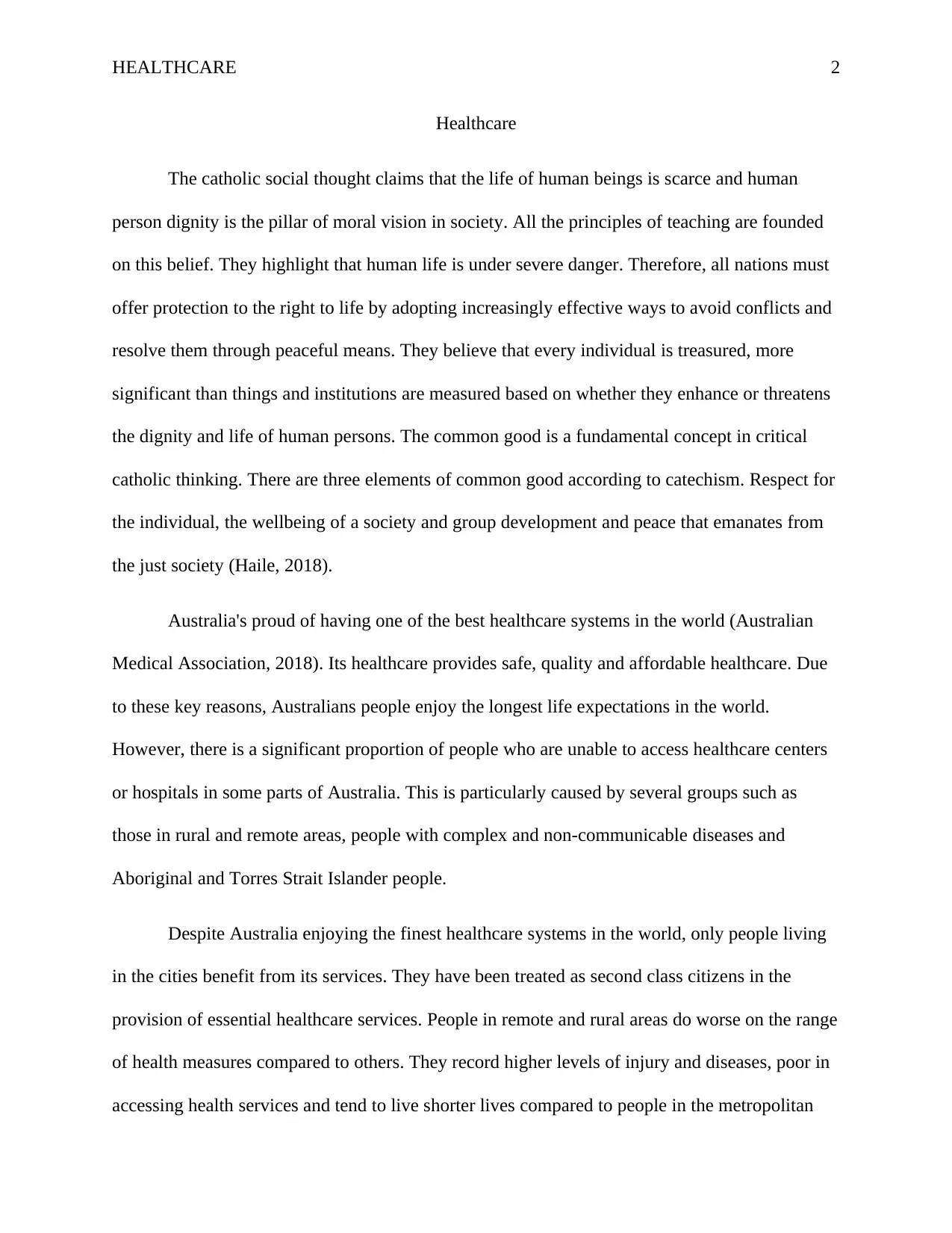
HEALTHCARE 2
Healthcare
The catholic social thought claims that the life of human beings is scarce and human
person dignity is the pillar of moral vision in society. All the principles of teaching are founded
on this belief. They highlight that human life is under severe danger. Therefore, all nations must
offer protection to the right to life by adopting increasingly effective ways to avoid conflicts and
resolve them through peaceful means. They believe that every individual is treasured, more
significant than things and institutions are measured based on whether they enhance or threatens
the dignity and life of human persons. The common good is a fundamental concept in critical
catholic thinking. There are three elements of common good according to catechism. Respect for
the individual, the wellbeing of a society and group development and peace that emanates from
the just society (Haile, 2018).
Australia's proud of having one of the best healthcare systems in the world (Australian
Medical Association, 2018). Its healthcare provides safe, quality and affordable healthcare. Due
to these key reasons, Australians people enjoy the longest life expectations in the world.
However, there is a significant proportion of people who are unable to access healthcare centers
or hospitals in some parts of Australia. This is particularly caused by several groups such as
those in rural and remote areas, people with complex and non-communicable diseases and
Aboriginal and Torres Strait Islander people.
Despite Australia enjoying the finest healthcare systems in the world, only people living
in the cities benefit from its services. They have been treated as second class citizens in the
provision of essential healthcare services. People in remote and rural areas do worse on the range
of health measures compared to others. They record higher levels of injury and diseases, poor in
accessing health services and tend to live shorter lives compared to people in the metropolitan
Healthcare
The catholic social thought claims that the life of human beings is scarce and human
person dignity is the pillar of moral vision in society. All the principles of teaching are founded
on this belief. They highlight that human life is under severe danger. Therefore, all nations must
offer protection to the right to life by adopting increasingly effective ways to avoid conflicts and
resolve them through peaceful means. They believe that every individual is treasured, more
significant than things and institutions are measured based on whether they enhance or threatens
the dignity and life of human persons. The common good is a fundamental concept in critical
catholic thinking. There are three elements of common good according to catechism. Respect for
the individual, the wellbeing of a society and group development and peace that emanates from
the just society (Haile, 2018).
Australia's proud of having one of the best healthcare systems in the world (Australian
Medical Association, 2018). Its healthcare provides safe, quality and affordable healthcare. Due
to these key reasons, Australians people enjoy the longest life expectations in the world.
However, there is a significant proportion of people who are unable to access healthcare centers
or hospitals in some parts of Australia. This is particularly caused by several groups such as
those in rural and remote areas, people with complex and non-communicable diseases and
Aboriginal and Torres Strait Islander people.
Despite Australia enjoying the finest healthcare systems in the world, only people living
in the cities benefit from its services. They have been treated as second class citizens in the
provision of essential healthcare services. People in remote and rural areas do worse on the range
of health measures compared to others. They record higher levels of injury and diseases, poor in
accessing health services and tend to live shorter lives compared to people in the metropolitan
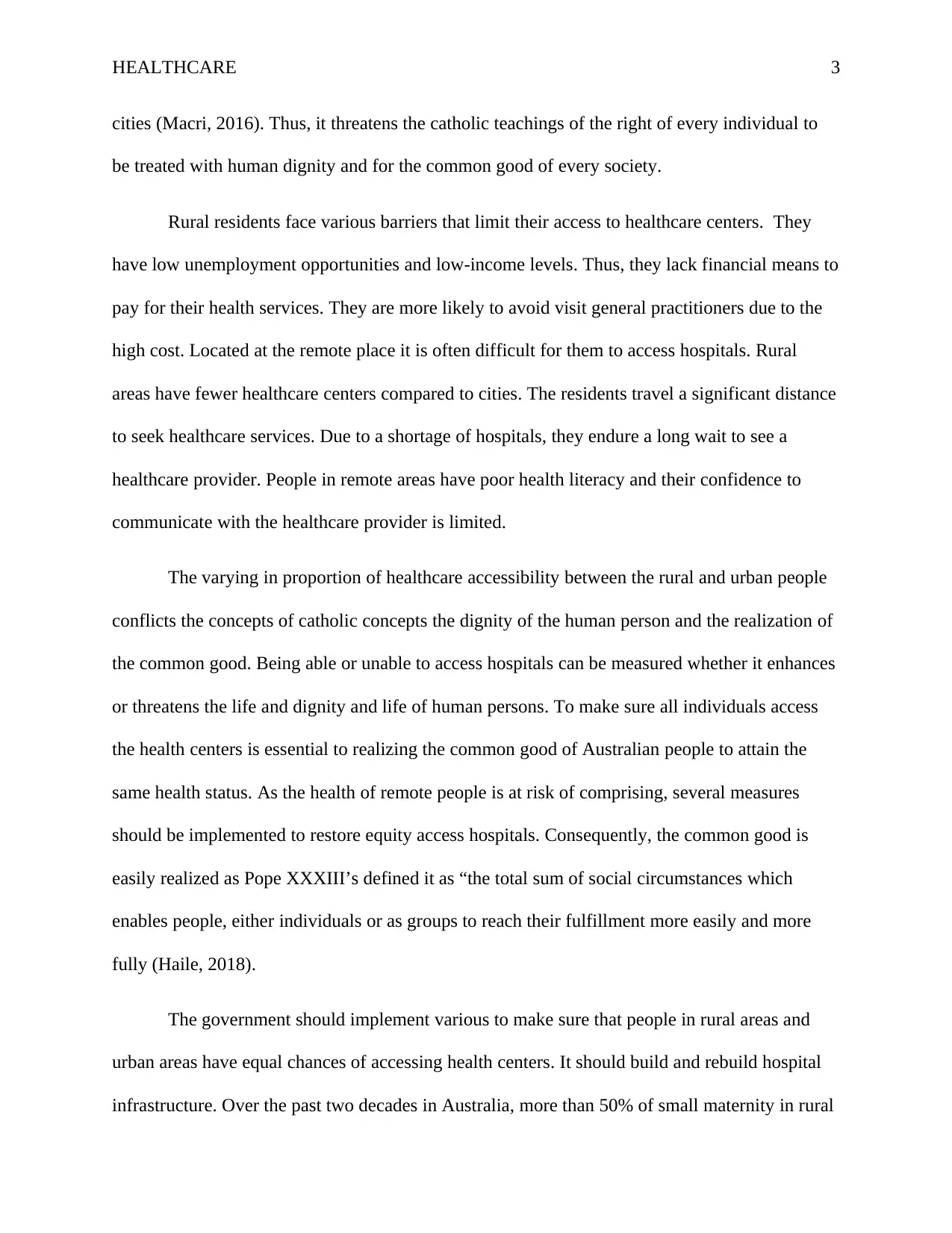
HEALTHCARE 3
cities (Macri, 2016). Thus, it threatens the catholic teachings of the right of every individual to
be treated with human dignity and for the common good of every society.
Rural residents face various barriers that limit their access to healthcare centers. They
have low unemployment opportunities and low-income levels. Thus, they lack financial means to
pay for their health services. They are more likely to avoid visit general practitioners due to the
high cost. Located at the remote place it is often difficult for them to access hospitals. Rural
areas have fewer healthcare centers compared to cities. The residents travel a significant distance
to seek healthcare services. Due to a shortage of hospitals, they endure a long wait to see a
healthcare provider. People in remote areas have poor health literacy and their confidence to
communicate with the healthcare provider is limited.
The varying in proportion of healthcare accessibility between the rural and urban people
conflicts the concepts of catholic concepts the dignity of the human person and the realization of
the common good. Being able or unable to access hospitals can be measured whether it enhances
or threatens the life and dignity and life of human persons. To make sure all individuals access
the health centers is essential to realizing the common good of Australian people to attain the
same health status. As the health of remote people is at risk of comprising, several measures
should be implemented to restore equity access hospitals. Consequently, the common good is
easily realized as Pope XXXIII’s defined it as “the total sum of social circumstances which
enables people, either individuals or as groups to reach their fulfillment more easily and more
fully (Haile, 2018).
The government should implement various to make sure that people in rural areas and
urban areas have equal chances of accessing health centers. It should build and rebuild hospital
infrastructure. Over the past two decades in Australia, more than 50% of small maternity in rural
cities (Macri, 2016). Thus, it threatens the catholic teachings of the right of every individual to
be treated with human dignity and for the common good of every society.
Rural residents face various barriers that limit their access to healthcare centers. They
have low unemployment opportunities and low-income levels. Thus, they lack financial means to
pay for their health services. They are more likely to avoid visit general practitioners due to the
high cost. Located at the remote place it is often difficult for them to access hospitals. Rural
areas have fewer healthcare centers compared to cities. The residents travel a significant distance
to seek healthcare services. Due to a shortage of hospitals, they endure a long wait to see a
healthcare provider. People in remote areas have poor health literacy and their confidence to
communicate with the healthcare provider is limited.
The varying in proportion of healthcare accessibility between the rural and urban people
conflicts the concepts of catholic concepts the dignity of the human person and the realization of
the common good. Being able or unable to access hospitals can be measured whether it enhances
or threatens the life and dignity and life of human persons. To make sure all individuals access
the health centers is essential to realizing the common good of Australian people to attain the
same health status. As the health of remote people is at risk of comprising, several measures
should be implemented to restore equity access hospitals. Consequently, the common good is
easily realized as Pope XXXIII’s defined it as “the total sum of social circumstances which
enables people, either individuals or as groups to reach their fulfillment more easily and more
fully (Haile, 2018).
The government should implement various to make sure that people in rural areas and
urban areas have equal chances of accessing health centers. It should build and rebuild hospital
infrastructure. Over the past two decades in Australia, more than 50% of small maternity in rural
⊘ This is a preview!⊘
Do you want full access?
Subscribe today to unlock all pages.

Trusted by 1+ million students worldwide
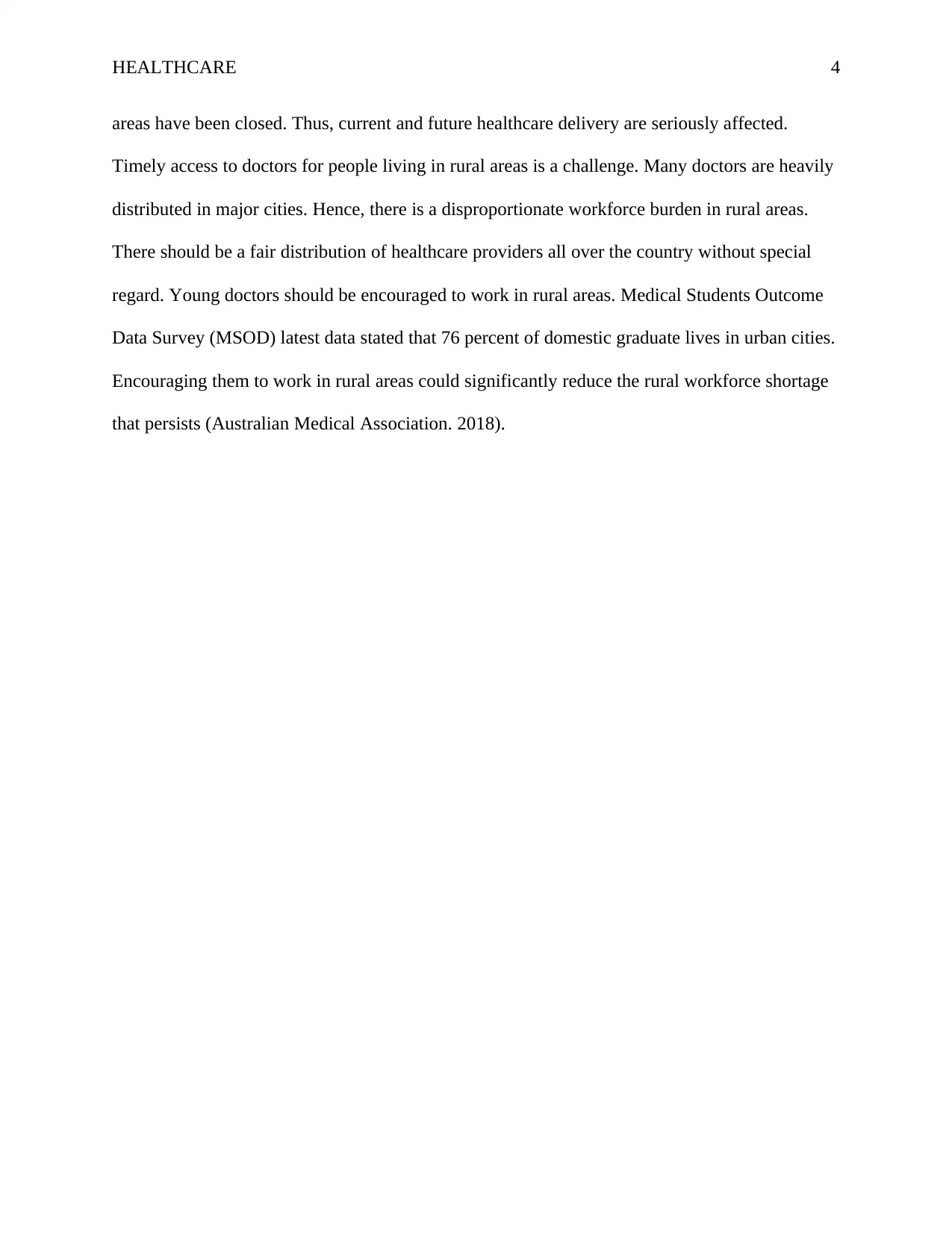
HEALTHCARE 4
areas have been closed. Thus, current and future healthcare delivery are seriously affected.
Timely access to doctors for people living in rural areas is a challenge. Many doctors are heavily
distributed in major cities. Hence, there is a disproportionate workforce burden in rural areas.
There should be a fair distribution of healthcare providers all over the country without special
regard. Young doctors should be encouraged to work in rural areas. Medical Students Outcome
Data Survey (MSOD) latest data stated that 76 percent of domestic graduate lives in urban cities.
Encouraging them to work in rural areas could significantly reduce the rural workforce shortage
that persists (Australian Medical Association. 2018).
areas have been closed. Thus, current and future healthcare delivery are seriously affected.
Timely access to doctors for people living in rural areas is a challenge. Many doctors are heavily
distributed in major cities. Hence, there is a disproportionate workforce burden in rural areas.
There should be a fair distribution of healthcare providers all over the country without special
regard. Young doctors should be encouraged to work in rural areas. Medical Students Outcome
Data Survey (MSOD) latest data stated that 76 percent of domestic graduate lives in urban cities.
Encouraging them to work in rural areas could significantly reduce the rural workforce shortage
that persists (Australian Medical Association. 2018).
Paraphrase This Document
Need a fresh take? Get an instant paraphrase of this document with our AI Paraphraser
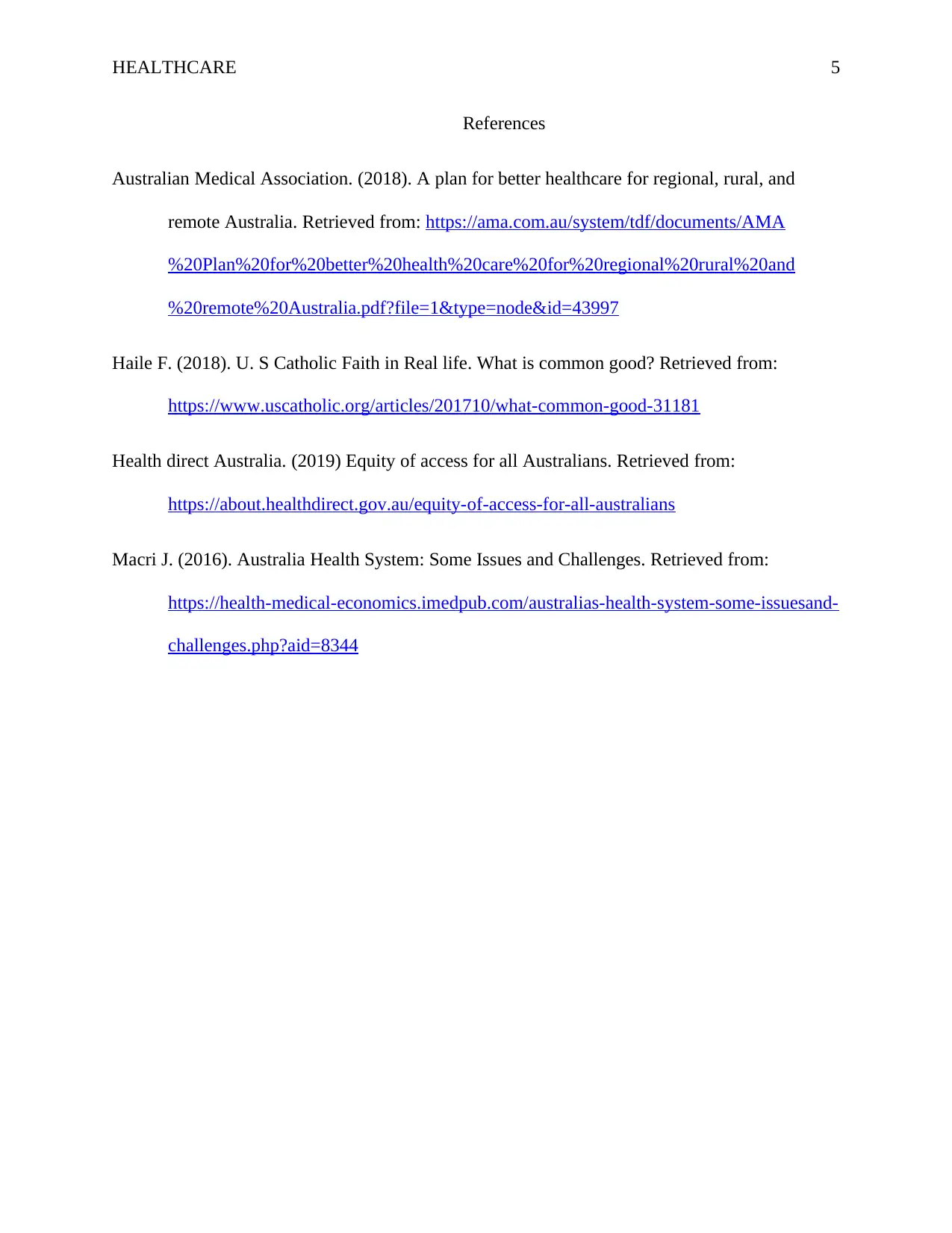
HEALTHCARE 5
References
Australian Medical Association. (2018). A plan for better healthcare for regional, rural, and
remote Australia. Retrieved from: https://ama.com.au/system/tdf/documents/AMA
%20Plan%20for%20better%20health%20care%20for%20regional%20rural%20and
%20remote%20Australia.pdf?file=1&type=node&id=43997
Haile F. (2018). U. S Catholic Faith in Real life. What is common good? Retrieved from:
https://www.uscatholic.org/articles/201710/what-common-good-31181
Health direct Australia. (2019) Equity of access for all Australians. Retrieved from:
https://about.healthdirect.gov.au/equity-of-access-for-all-australians
Macri J. (2016). Australia Health System: Some Issues and Challenges. Retrieved from:
https://health-medical-economics.imedpub.com/australias-health-system-some-issuesand-
challenges.php?aid=8344
References
Australian Medical Association. (2018). A plan for better healthcare for regional, rural, and
remote Australia. Retrieved from: https://ama.com.au/system/tdf/documents/AMA
%20Plan%20for%20better%20health%20care%20for%20regional%20rural%20and
%20remote%20Australia.pdf?file=1&type=node&id=43997
Haile F. (2018). U. S Catholic Faith in Real life. What is common good? Retrieved from:
https://www.uscatholic.org/articles/201710/what-common-good-31181
Health direct Australia. (2019) Equity of access for all Australians. Retrieved from:
https://about.healthdirect.gov.au/equity-of-access-for-all-australians
Macri J. (2016). Australia Health System: Some Issues and Challenges. Retrieved from:
https://health-medical-economics.imedpub.com/australias-health-system-some-issuesand-
challenges.php?aid=8344
1 out of 5
Related Documents
Your All-in-One AI-Powered Toolkit for Academic Success.
+13062052269
info@desklib.com
Available 24*7 on WhatsApp / Email
![[object Object]](/_next/static/media/star-bottom.7253800d.svg)
Unlock your academic potential
Copyright © 2020–2026 A2Z Services. All Rights Reserved. Developed and managed by ZUCOL.





